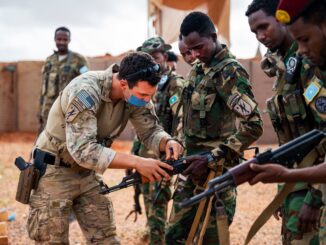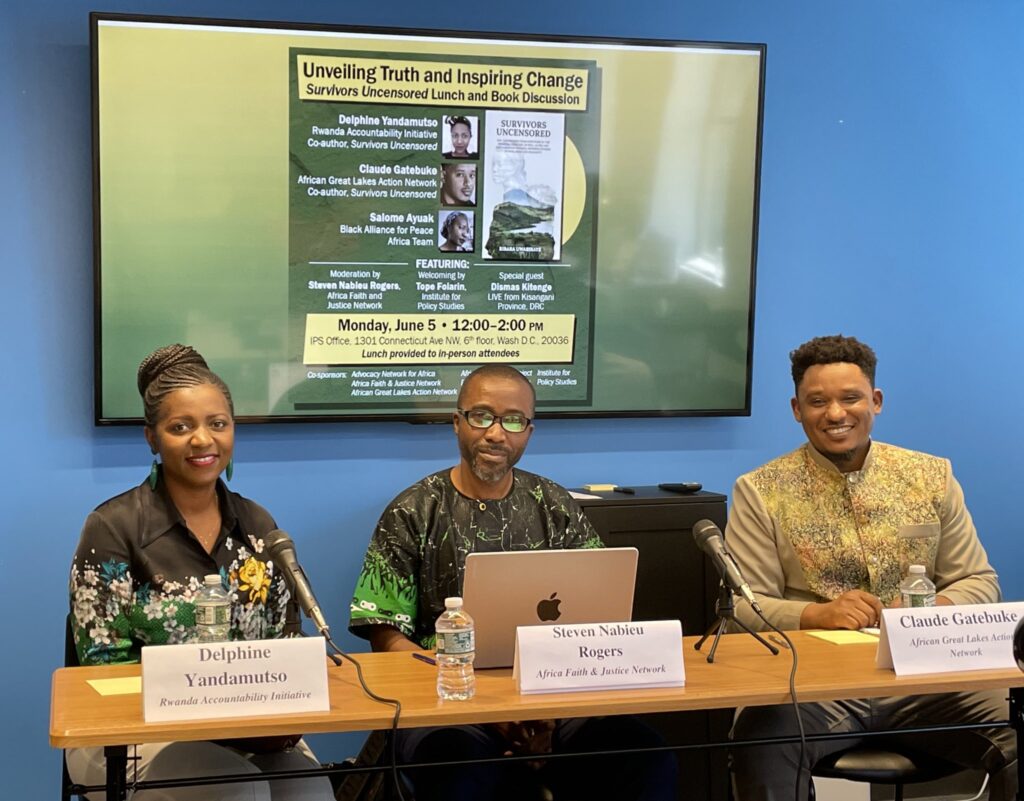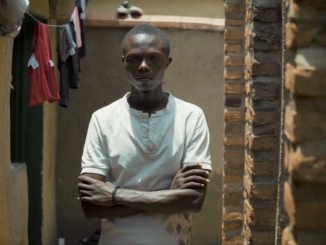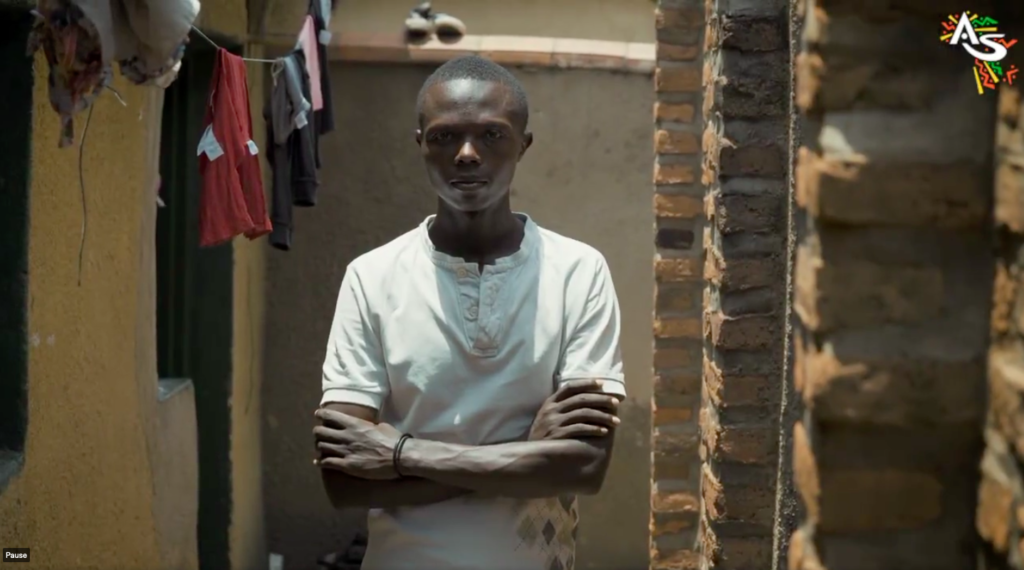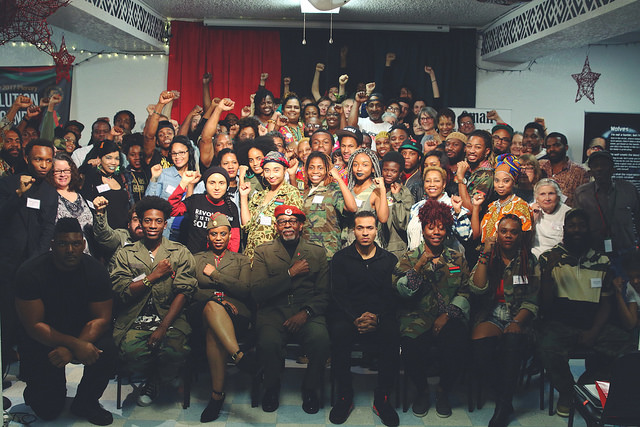
Activists on the left, as well as radical U.S.-based organizations, came out yesterday against the indictments of three members of the African People’s Socialist Party (APSP), one former party member, and three Russian nationals for allegedly attempting to sow discord in the United States by working with Russia.
The U.S. Department of Justice (DOJ) announced Tuesday, April 18, that a federal grand jury returned a “superseding indictment” charging the four people with:
…working on behalf of the Russian government and in conjunction with the Russian Federal Security Service (FSB) to conduct a multi-year foreign malign influence campaign in the United States. Among other conduct, the superseding indictment alleges that the Russian defendants recruited, funded and directed U.S. political groups to act as unregistered illegal agents of the Russian government and sow discord and spread pro-Russian propaganda; the indicted intelligence officers, in particular, participated in covertly funding and directing candidates for local office within the United States.
The four charged include:
- Omali Yeshitela, a U.S. citizen residing in St. Petersburg, Florida, and St. Louis, Missouri, who serves as the chairman and founder of the APSP;
- Penny Joanne Hess, a U.S. citizen residing in St. Petersburg, Florida, and St. Louis, Missouri, who is chairperson of the African People’s Solidarity Committee;
- Jesse Nevel, a U.S. citizen residing in St. Petersburg, Florida, and St. Louis, Missouri, who is chair of the APSP’s Uhuru Solidarity Movement; and
- Augustus C. Romain Jr., aka Gazi Kodzo, a U.S. citizen residing in St. Petersburg, Florida, and Atlanta, who once served as secretary-general of the APSP and is a founder of the Black Hammer Organization in Georgia.
Repressing Africans in Struggle
Hess and Nevel are white solidarity members. Nevertheless, that an African organization was targeted has raised concerns.
Anti-imperialist African organization Black Alliance for Peace yesterday issued a statement pointing to the U.S. government’s history of repressing the African liberation struggle:
Not since the Palmer Raids of the early 20th century, nor since the indictment of W.E.B DuBois in 1951, or the confiscation of Paul Robeson’s U.S. passport during the anti-communist “McCarthyist” era, has there been such a hysterical response to African people asserting their rights and freedom of speech in the United States. This renewed attack against anti-imperialist Africans, framed within the absurd notion of “Russian influence,” comes as capitalism decays and U.S. global hegemony loses its hold on the world. The attacks on the APSP and the Uhuru Movement are part of a historical tendency to align African political activists with U.S. “adversary” states to marginalize African internationalism (including solidarity with Cuba and Palestine, for example) and to suppress Black radicalism.
It is also an assault on the efforts of Africans organizing against the violence and murders suffered at the hands of the U.S. state. Indeed, Africans do not need Russia to tell them they are suffering the brunt of violence in the heart of the U.S. empire!
Wayne State University professor Dr. Charisse Burden-Stelly noted her forthcoming book, Black Scare/Red Scare, points to the APSP raid of July 2022 to draw the connection between U.S. domestic anti-communist purges of the past and repression of activists today.
“It is no coincidence that an African socialist organization is being targeted,” she tweeted.
US charges 4 Americans, 3 Russians in election discord case
I start the epilogue of Black Scare/Red Scare with this case to discuss the resonances of those scares today. It is no coincidence that an African socialist organization is being targeted. https://t.co/SnVgP94m3N
— Dr. CBS (@blackleftaf) April 19, 2023
Interfering in Elections
The DOJ attempted to connect the charged activists with a Russian conspiracy to interfere in U.S. elections, beginning with the 2016 election of Trump.
“Russia’s foreign intelligence service allegedly weaponized our First Amendment rights—freedoms Russia denies its own citizens—to divide Americans and interfere in elections in the United States,” said Assistant Attorney General Matthew G. Olsen of the DOJ’s National Security Division.
However, much evidence exists to show the United States interferes the most in other countries’ elections and democratic processes. Aside from invading 201 countries since the end of World War II, the United States deployed 64 covert operations to subvert governments around the world between 1947 and 1989, according to political scientist Lindsey O’Rourke. Meanwhile, political scientist Dov Levin’s work found the United States interfered in 81 elections between 1946 and 2000.
Attacking Activists
The APSP had been preparing for this moment since late December, when they received “strong indications” of indictments coming down in early 2023 after the FBI had raided the party’s properties in July 2022, as Toward Freedom had reported. Then the APSP announced last month that Regions Bank, a financial institution in the U.S. South, had closed the party’s accounts and withdrawn lines of credit. The APSP referred to that move as “U.S. economic sanctions” on Black community projects.
Freedom Road Socialist Organization also issued a statement that referred to more recent history of repression.
On September 24, 2010, the FBI raided seven homes of anti-war activists and the office of the Twin Cities Anti-War committee. All told, twenty-three activists were subpoenaed to a Chicago-based grand jury that claimed to be investigating “material support for terrorism.” As time went on, the FBI continued their attack on anti-war and international solidarity activists by targeting important veterans of the movement who worked with the Anti-war 23, including Chicano activist Carlos Montes in Los Angeles and Palestinian organizer Rasmea Odeh in Chicago. A national defense campaign defeated most of these attacks.
Toward Freedom Board Secretary and independent journalist Jacqueline Luqman commented on the danger for all activists who oppose U.S. global hegemony.
“Today it’s the APSP. Tomorrow it could be you and me,” she tweeted. “All you need to do is oppose US imperialist policy in Ukraine and Palmer Raids 2023 will be unleashed to silence you.”
Today it's the APSP. Tomorrow it could be you and me. All you need to do is oppose US imperialist policy in Ukraine and the Palmer Raids 2023 will be unleashed to silence you. #NoCompromiseNoRetreat https://t.co/E9qb3pQz1F
— Luqman Nation Media (@luqmannation1) April 19, 2023
Julie Varughese is editor of Toward Freedom.

